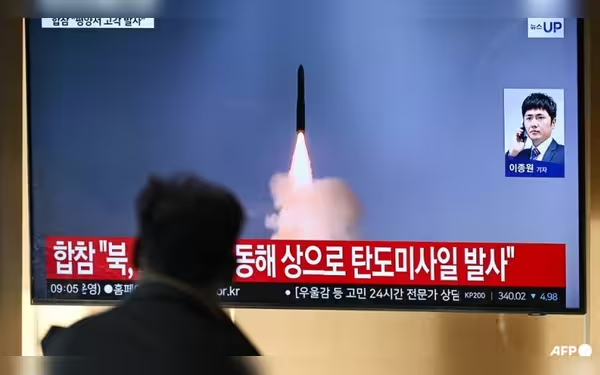Thursday, November 7, 2024 07:24 AM
North Korea Tests New Hwasong-19 ICBM Amid Global Tensions
- North Korea successfully tests Hwasong-19 intercontinental ballistic missile.
- Missile launch occurred just before U.S. presidential election.
- U.S. and South Korea conduct joint military drills in response.
 Image Credits: channelnewsasia
Image Credits: channelnewsasiaNorth Korea successfully tests the Hwasong-19 ICBM, raising global security concerns and prompting U.S. and South Korea military drills.
North Korea has recently made headlines with the successful test of its new intercontinental ballistic missile (ICBM), known as the Hwasong-19. This missile is significant because it is a solid-fuel type, which means it can be launched more quickly than liquid-fuel missiles. The test took place on November 1, and North Korean state media proudly announced that this missile flew higher than any previous missile tested by the country. The flight was tracked by military forces in South Korea and Japan, confirming that it soared deep into space before landing in the ocean between Japan and Russia.
The North Korean state news agency, KCNA, described the Hwasong-19 as "the world's strongest strategic missile." This claim raises questions about North Korea's ability to effectively guide such a missile and ensure the safety of a nuclear warhead during reentry into the atmosphere. However, experts agree that the Hwasong-19, like other recent ICBMs developed by North Korea, has the potential to reach nearly any location in the United States.
During the launch, North Korean leader Kim Jong Un emphasized the importance of this missile, stating, "The new-type ICBM proved before the world that the hegemonic position we have secured in the development and manufacture of nuclear delivery means of the same kind is absolutely irreversible." This statement reflects North Korea's ongoing efforts to assert its military capabilities on the global stage.
The timing of this missile test is particularly noteworthy, as it occurred just days before the U.S. presidential election. The launch drew immediate condemnation from the United States and its allies, including South Korea, Japan, and European nations. The United Nations Secretary-General also expressed concern over the situation. Ankit Panda, a senior fellow at the Carnegie Endowment for International Peace, remarked that the missile test enhances North Korea's strategic deterrent capabilities, suggesting that Kim Jong Un is keen to send a clear message to the U.S.
In response to North Korea's provocative actions, the South Korean and U.S. air forces conducted their first-ever joint live-fire attack drills. These exercises involved unmanned aerial vehicles, including the Global Hawk and Reaper drones, which dropped GPS-guided munitions in simulated strikes against enemy targets. This collaboration highlights the commitment of the U.S. and its allies to maintain security in the region.
As the world watches these developments unfold, it is essential to consider the broader implications of North Korea's missile tests. The ongoing military advancements by North Korea not only pose a threat to regional stability but also challenge international efforts to promote peace and security. The situation calls for continued vigilance and diplomatic engagement to address the complexities of North Korea's military ambitions and their impact on global security.













